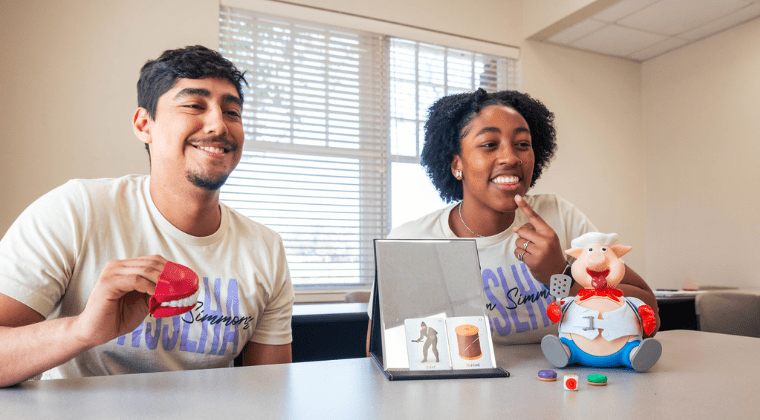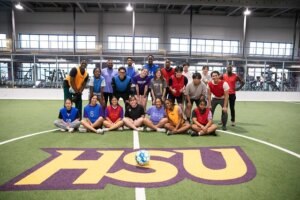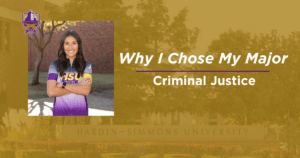How HSU Plans to Use SPEAK OUT!® Therapy Program to Empower Parkinson Community

Hardin-Simmons University’s speech-language pathology program is taking a bold step to support individuals living with Parkinson’s and related neurological disorders.
HSU professor Christine Sanchez completed the necessary training to become a Certified SPEAK OUT!® Provider through Parkinson Voice Project®. HSU will begin using the SPEAK OUT!® Therapy Program, developed by the Parkinson Voice Project, in the Fall 2025 — expanding services, empowering students, and filling a vital gap in West Texas.
“Our goal is just to help individuals with Parkinson’s have all the tools they need to maintain their speech over the course of their disease,” said Christine Sanchez, Instructor of Speech Language Pathology and Assistant Graduate Program Director for Hardin-Simmons University.
The SPEAK OUT! program at HSU began with a conversation between the university’s physical therapy and speech-language pathology departments. Dr. Jill Jumper recognized a need for speech services among the Parkinson’s community and approached Sanchez about a possible partnership.
“I looked into getting SPEAK OUT! certified and saw that they had a clinical grant that universities could apply for. I waited until that grant opened in January, applied, and got it,” Sanchez explained.
The grant allowed two HSU faculty members to be certified in the program and gives students free access to professional-level training, opening new clinical opportunities for both students and patients.
What Sets SPEAK OUT! Apart
Unlike general speech therapy models, SPEAK OUT! is specifically designed for individuals with Parkinson’s disease. Built around the concept of “speaking with INTENT,” the therapy focuses on helping patients strengthen their voices through purposeful effort.
“It’s very structured and very targeted for people with Parkinson’s disease,” Sanchez said. “There’s a lot of research on it, which is nice because there are a lot of techniques that we can use and apply to many different people.”
Compared to other programs like LSVT LOUD, SPEAK OUT! is shorter in duration but delivers similar outcomes, making it more accessible for patients.
“The thing about Parkinson’s is these people are going to have to exercise for the rest of their lives. If they stop the exercise process, they will return to baseline,” Sanchez said. “SPEAK OUT! creates a motivating community that helps patients continue to work on their speech so they don’t lapse back.”
Building a Community of Support
Although weekly group sessions are not set to launch until Fall 2025, the therapy model begins with six weeks of one-on-one sessions, followed by a weekly maintenance group. These ongoing group meetings offer encouragement and accountability, helping patients stay consistent with their vocal exercises and sustain long-term progress.
“It’s not just about therapy. It’s about giving people a space where they can keep working on their speech and feel supported,” Sanchez shared.
HSU’s collaboration between speech and physical therapy services also creates a coordinated care model, offering a one-stop location for multiple types of rehabilitation.
“We have a gentleman who was going to the PT program, and he complained about his speech. So now, he comes to speech therapy and then goes straight to exercise,” Sanchez said. “It’s nice that it works out for his schedule and that our services are treating the whole person, not just part of the problem.”
A Growing Clinic and Future Plans
SPEAK OUT! marks an expansion for HSU’s clinic, which launched an aphasia support group for stroke survivors and their care partners in 2022. Now, with Parkinson’s services added, the clinic is reaching a broader population.
“Parkinson’s is the second most common neurodegenerative disease, and there are a lot of people in the Abilene region who aren’t being served,” Sanchez said.
Along with helping the broader region gain access to therapy services, HSU’s SPEAK OUT! program is transforming education. Graduate students now receive training that mirrors professional certification, preparing them to enter the workforce with specialized clinical skills.
“You can’t be officially certified as a student, but you can go through the exact same training as a certified SLP,” Sanchez explained. “When they graduate, they’ll have that experience, and it will make them more marketable.”
How to Get Involved
Individuals diagnosed with Parkinson’s or related disorders are encouraged to reach out for therapy services. Enrollment will be handled through direct faculty contact to ensure each participant is matched appropriately with services.
“This is about making sure people can live their fullest lives,” Sanchez said. “It’s about keeping people connected to their families, to their communities, and to their voice.”


